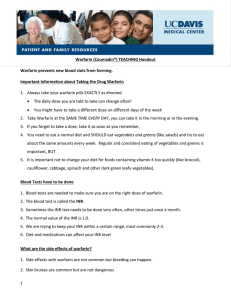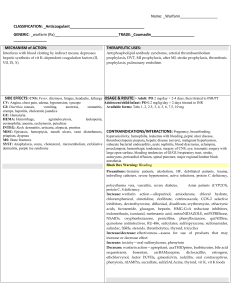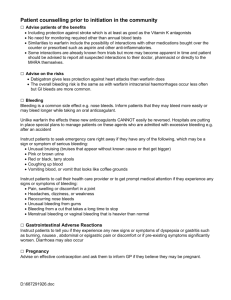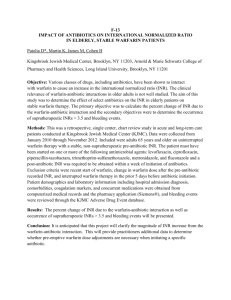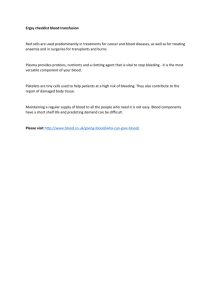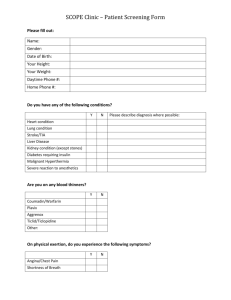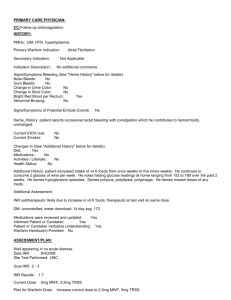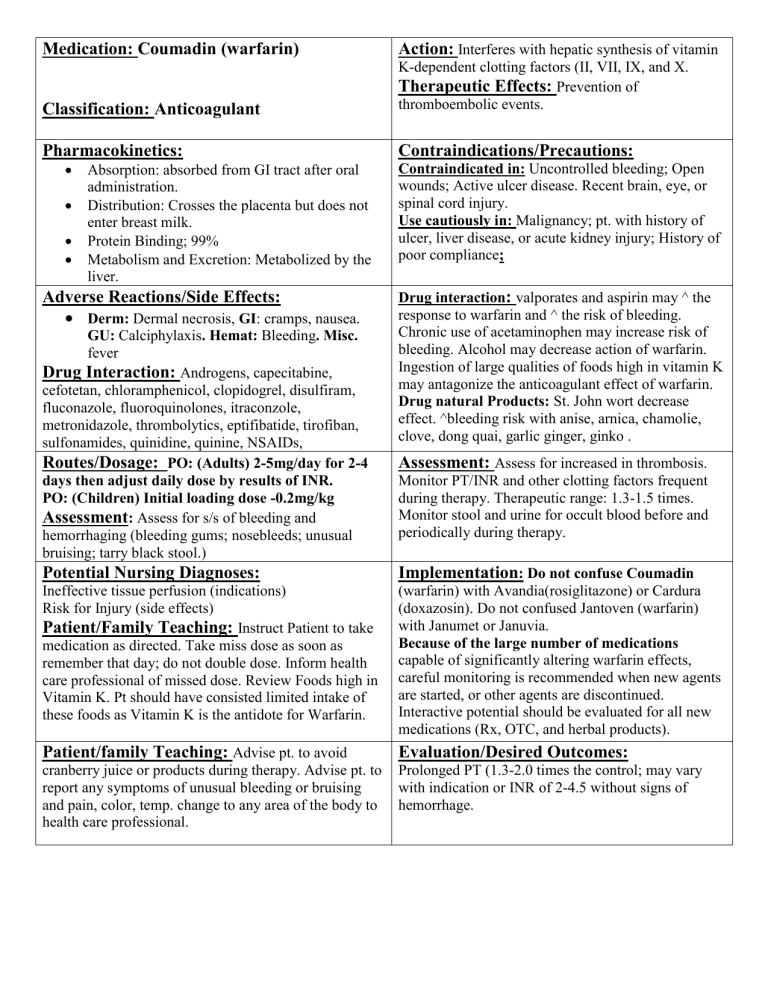
Medication: Coumadin (warfarin) Action: Interferes with hepatic synthesis of vitamin Classification: Anticoagulant K-dependent clotting factors (II, VII, IX, and X. Therapeutic Effects: Prevention of thromboembolic events. Pharmacokinetics: Contraindications/Precautions: Absorption: absorbed from GI tract after oral administration. Distribution: Crosses the placenta but does not enter breast milk. Protein Binding; 99% Metabolism and Excretion: Metabolized by the liver. Adverse Reactions/Side Effects: Derm: Dermal necrosis, GI: cramps, nausea. GU: Calciphylaxis. Hemat: Bleeding. Misc. fever Drug Interaction: Androgens, capecitabine, cefotetan, chloramphenicol, clopidogrel, disulfiram, fluconazole, fluoroquinolones, itraconzole, metronidazole, thrombolytics, eptifibatide, tirofiban, sulfonamides, quinidine, quinine, NSAIDs, Routes/Dosage: PO: (Adults) 2-5mg/day for 2-4 days then adjust daily dose by results of INR. PO: (Children) Initial loading dose -0.2mg/kg Assessment: Assess for s/s of bleeding and hemorrhaging (bleeding gums; nosebleeds; unusual bruising; tarry black stool.) Contraindicated in: Uncontrolled bleeding; Open wounds; Active ulcer disease. Recent brain, eye, or spinal cord injury. Use cautiously in: Malignancy; pt. with history of ulcer, liver disease, or acute kidney injury; History of poor compliance; Drug interaction: valporates and aspirin may ^ the response to warfarin and ^ the risk of bleeding. Chronic use of acetaminophen may increase risk of bleeding. Alcohol may decrease action of warfarin. Ingestion of large qualities of foods high in vitamin K may antagonize the anticoagulant effect of warfarin. Drug natural Products: St. John wort decrease effect. ^bleeding risk with anise, arnica, chamolie, clove, dong quai, garlic ginger, ginko . Assessment: Assess for increased in thrombosis. Monitor PT/INR and other clotting factors frequent during therapy. Therapeutic range: 1.3-1.5 times. Monitor stool and urine for occult blood before and periodically during therapy. Potential Nursing Diagnoses: Implementation: Do not confuse Coumadin Ineffective tissue perfusion (indications) Risk for Injury (side effects) Patient/Family Teaching: Instruct Patient to take medication as directed. Take miss dose as soon as remember that day; do not double dose. Inform health care professional of missed dose. Review Foods high in Vitamin K. Pt should have consisted limited intake of these foods as Vitamin K is the antidote for Warfarin. (warfarin) with Avandia(rosiglitazone) or Cardura (doxazosin). Do not confused Jantoven (warfarin) with Janumet or Januvia. Because of the large number of medications capable of significantly altering warfarin effects, careful monitoring is recommended when new agents are started, or other agents are discontinued. Interactive potential should be evaluated for all new medications (Rx, OTC, and herbal products). Patient/family Teaching: Advise pt. to avoid Evaluation/Desired Outcomes: cranberry juice or products during therapy. Advise pt. to report any symptoms of unusual bleeding or bruising and pain, color, temp. change to any area of the body to health care professional. Prolonged PT (1.3-2.0 times the control; may vary with indication or INR of 2-4.5 without signs of hemorrhage.
